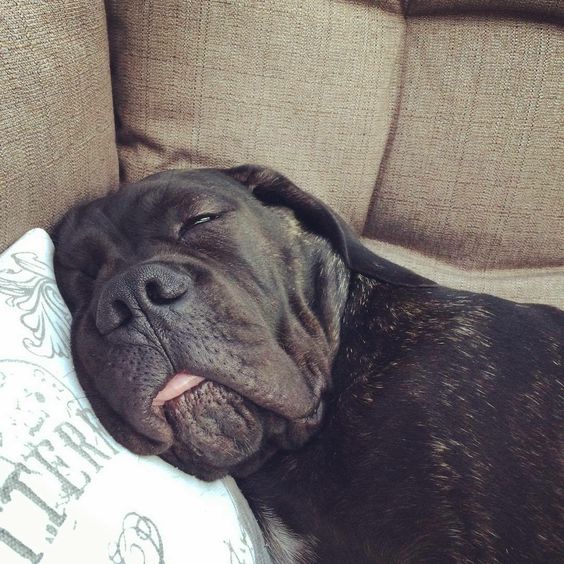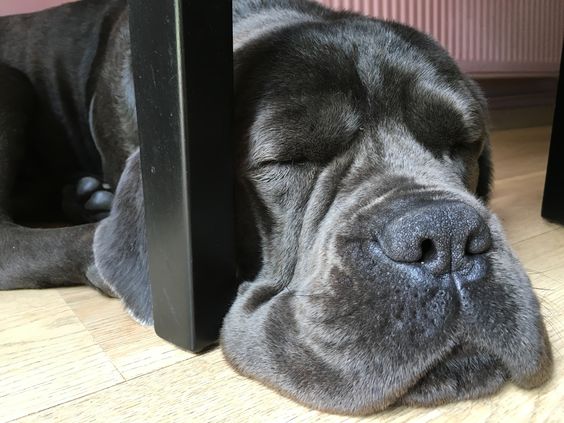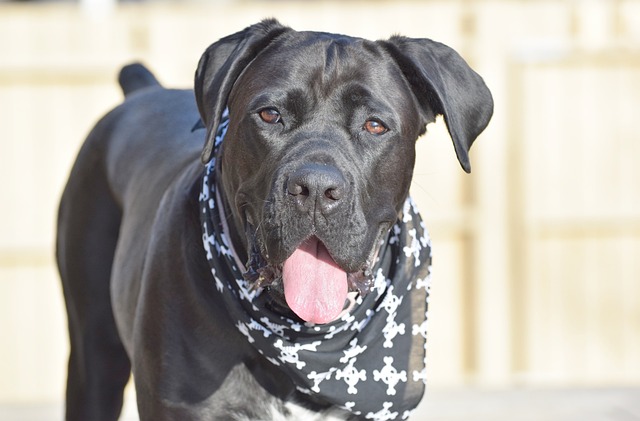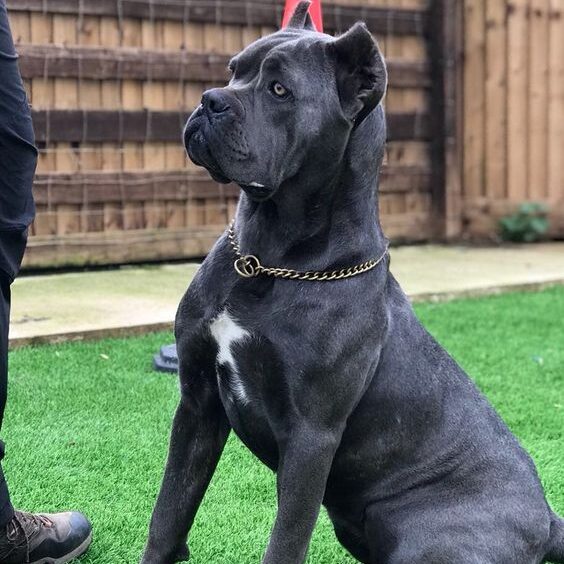
Cane Corsos, known for their majestic appearance and loyal nature, are remarkable dogs that require a significant amount of sleep to maintain their well-being. While it might seem like they’re lazing around most of the day, understanding the importance of sleep for your Cane Corso is crucial for their health and happiness. “Cane Corso Sleep Guide”
Why Sleeping is Necessary for a Cane Corso
Cane Corsos, like all dogs, have distinct sleep needs dictated by their biology and age. Understanding these needs is the first step in ensuring your furry friend’s overall well-being.
Understanding the Canine Sleep Cycle
Dogs, including Cane Corsos, go through a sleep cycle similar to humans. This cycle consists of different stages, including non-rapid eye movement (NREM) and rapid eye movement (REM) sleep. These stages serve various purposes, such as physical recovery and mental rejuvenation. Dogs typically cycle through these stages several times during their sleep.
NREM Stages 1 and 2: These stages are lighter sleep phases where your Cane Corso can be easily awakened. During these stages, their muscles begin to relax, and their heart rate and body temperature decrease.
Deep NREM Stage 3: This is the restorative phase where muscle repair and growth occur. It’s essential for your dog’s physical well-being.
REM Sleep: In this phase, your dog’s brain is highly active, similar to when they’re awake. It’s believed to be crucial for their mental health and cognitive function.
Physical and Mental Health Benefits
Adequate sleep plays a pivotal role in maintaining your Cane Corso’s physical health and mental stability. Here are some of the benefits:
1. Restorative Effects: During deep sleep, your Cane Corso’s body repairs tissues and strengthens its immune system. This is particularly important for puppies, as it supports their rapid growth.
2. Behavioral Impact: Proper sleep helps regulate mood and behavior. A well-rested Cane Corso is more likely to be obedient, responsive, and less prone to anxiety or aggression.
3. Cognitive Function: REM sleep is associated with memory consolidation and learning. A good night’s sleep can enhance your dog’s ability to pick up new commands and tricks.
In summary, sleep is not a luxury for your Cane Corso; it’s a necessity. Understanding their sleep cycle and the physical and mental health benefits it provides can lead to a happier and healthier life for your beloved pet. Ensuring they get the right amount of rest will help them thrive and remain your loyal companion for years to come.
Sleeping Times at Different Ages
Cane Corsos, like all dogs, experience changes in their sleep patterns and requirements as they grow and mature. Understanding these age-related differences in sleeping times is essential for providing optimal care to your furry companion.
| Age of Cane Corso | Recommended Hours of Sleep per Day |
|---|---|
| Newborn (0-2 months) | 18-20 hours |
| Puppy (2-6 months) | 16-20 hours |
| Adolescent (6-12 months) | 14-16 hours |
| Adult (1-7 years) | 12-14 hours |
| Senior (7+ years) | 12-14 hours |
Puppies and Sleep
Puppies, those adorable bundles of energy and curiosity, have sleep needs that differ significantly from their adult counterparts. It’s crucial to comprehend these needs to ensure your Cane Corso puppy develops into a healthy and well-adjusted adult dog.
1. Newborns’ Sleep Patterns: Cane Corso puppies start their lives with a sleep schedule that might seem erratic to us. Newborns can sleep for up to 90% of the day, but their sleep is divided into short, frequent naps. This is when they grow, develop, and recover from the excitement of being born.
2. Transitioning to a Regular Sleep Schedule: As puppies age, they gradually adapt to a more structured sleep routine. By the time they reach three months of age, most Cane Corso puppies can sleep through the night and have more extended periods of wakefulness during the day.
Adolescents and Adults
As your Cane Corso transitions from puppyhood to adulthood, their sleep patterns will change again. Understanding these shifts can help you provide appropriate care and ensure their well-being.
1. Sleep Changes as Cane Corsos Grow: Adolescent and adult Cane Corsos typically require less sleep than puppies. While puppies may sleep 16-20 hours a day, adult Cane Corsos generally need 12-14 hours of sleep. This reduction in sleep time corresponds to their decreased growth rate and increased energy levels.
2. Establishing a Routine for Adult Dogs: To ensure your adult Cane Corso gets the right amount of sleep, establish a consistent daily routine. Regular exercise, mental stimulation, and a comfortable sleeping area are essential. Remember that maintaining a balanced lifestyle, including diet and exercise, contributes to a healthy sleep pattern.
It’s important to note that individual dogs may have variations in their sleep needs, so it’s crucial to pay attention to your Cane Corso’s specific behavior and energy levels. Adequate sleep at every stage of their life is vital for their physical and mental well-being. By understanding and accommodating their changing sleep requirements, you’ll be better equipped to provide the best care for your loyal companion throughout their life.
Why My Cane Corso Is Sleeping So Much
Seeing your Cane Corso sleeping more than usual can be a cause for concern, but it’s essential to delve into the potential reasons behind their increased sleep. While Cane Corsos are known for their robust and energetic nature, there are legitimate factors that can lead to extended periods of rest.
Health Concerns
One of the primary reasons your Cane Corso might be sleeping excessively is due to underlying health issues. Dogs, like humans, may sleep more when they are unwell. It’s crucial to keep an eye out for signs of illness that could be affecting your furry friend.
Illnesses that May Lead to Increased Sleep: Various medical conditions, such as infections, injuries, or chronic pain, can sap your Cane Corso’s energy and lead to increased sleep as their body works to heal itself. Keep an eye out for any unusual symptoms like lethargy, loss of appetite, or changes in behavior that may indicate an underlying problem.
How to Differentiate Between Normal and Excessive Sleep: While Cane Corsos do enjoy their beauty rest, it’s essential to recognize when their sleep patterns become abnormal. If your dog is consistently lethargic, unresponsive, or sleeps excessively for several days without a clear cause, consult your veterinarian for a thorough examination.
Age-Related Factors
Age plays a significant role in your Cane Corso’s sleep patterns. Just as with humans, sleep needs and habits can change as your dog matures.
Senior Cane Corsos and Their Sleep Needs: Senior Cane Corsos often require more sleep than their younger counterparts. As they age, their bodies may struggle with mobility or pain, and increased sleep can be a way to cope with discomfort. Providing a comfortable and supportive sleeping area can make a significant difference in their quality of rest.
Adapting to Changes in Sleep Patterns: Understanding that age-related changes in sleep are normal is essential for every Cane Corso owner. As your dog gets older, adapt to their evolving needs by providing the necessary care and attention to ensure they are comfortable during their golden years.
Should I Let My Cane Corso Sleep with Me?
The age-old debate of whether or not to allow your Cane Corso to share your bed is a common dilemma for dog owners. While the decision ultimately depends on your personal preferences and lifestyle, it’s essential to consider the pros and cons of co-sleeping with your loyal companion.
Pros and Cons
Pros of Letting Your Cane Corso Sleep with You
- Bonding: Sharing a bed with your Cane Corso can strengthen the bond between you and your furry friend. The physical closeness fosters a sense of security and attachment, which can be especially beneficial for puppies and newly adopted dogs.
- Warmth and Comfort: Cane Corsos are known for their love of warmth and comfort. Sleeping with you provides them with a cozy and warm sleeping environment, which can be particularly soothing during colder nights.
- Reduced Anxiety: Co-sleeping can reduce separation anxiety in some dogs. Knowing that their owner is nearby can alleviate stress and promote a sense of security.
Cons of Letting Your Cane Corso Sleep with You
- Boundary Issues: Allowing your Cane Corso to sleep in your bed may blur the lines of hierarchy in your household. Some dogs may become dominant or exhibit behavior problems if they feel they have equal status with their human.
- Allergies and Hygiene: Sharing a bed with your dog can lead to allergen exposure, especially if you have allergies. Additionally, dogs can track dirt and allergens into the bed, potentially affecting your sleep quality.
- Sleep Disturbances: Dogs may move around, snore, or wake up during the night, which can disrupt your sleep. This is particularly relevant if your Cane Corso is a restless sleeper.
Tips for Safe Co-Sleeping

If you decide to let your Cane Corso sleep with you, it’s essential to establish guidelines to ensure a safe and harmonious sleeping arrangement.
Set Clear Boundaries: Teach your dog where they are allowed to sleep on the bed and establish boundaries from the beginning to prevent dominance or aggression issues.
Maintain Hygiene: Wash your bedding regularly, and consider using a separate blanket or cover for your dog to minimize allergen exposure.
Regular Exercise: Ensure your Cane Corso gets sufficient exercise during the day to reduce restlessness at night.
Comfortable Sleeping Area: Provide a comfortable and supportive sleeping area for your dog, even if they share the bed. Consider a dog bed or mattress beside your own.
FAQs
1. How much sleep does a Cane Corso need?
Cane Corsos typically need around 12-14 hours of sleep per day. Puppies and younger dogs may require more, while senior dogs might need a bit less.
2. What are the stages of sleep in dogs?
The sleep cycle in dogs consists of four stages: NREM (non-rapid eye movement) stages 1 and 2, followed by deep NREM stage 3, and finally, REM (rapid eye movement) sleep. Each stage serves different functions in rest and recovery.
3. Can health problems cause excessive sleep in Cane Corsos?
Yes, certain health issues, such as infections, pain, or metabolic conditions, can lead to increased sleep in Cane Corsos. If you notice a sudden change in your dog’s sleep patterns, consult your veterinarian.
4. How can I help my Cane Corso transition to a regular sleep schedule?
Establish a consistent daily routine, including meal times and exercise. Create a comfortable and quiet sleeping environment for your dog, and be patient as they adjust to the new schedule.
5. Is it safe to let my Cane Corso sleep in bed with me?
Allowing your dog to sleep with you can be safe if you set clear boundaries and ensure your dog respects them. Make sure both you and your dog are comfortable with this arrangement.
6. Are there specific illnesses that can affect a Cane Corso’s sleep patterns?
Yes, conditions like hypothyroidism, arthritis, and certain infections can disrupt your dog’s sleep. Consult your vet if you suspect any health issues affecting your dog’s sleep.
7. Should I wake my Cane Corso if they’re having a bad dream during REM sleep?
It’s generally best to let your dog wake naturally from a bad dream. Waking them abruptly may startle them, but offering comfort once they wake is a good practice.
8. Can Cane Corsos experience insomnia?
Yes, just like humans, dogs can experience insomnia. If your Cane Corso consistently struggles with sleeplessness, consult your veterinarian to rule out underlying health issues.
9. What can I do to ensure my Cane Corso gets quality sleep?
Provide regular exercise, a comfortable sleeping area, and a consistent routine. Keep noise and disturbances to a minimum during your dog’s designated sleep time.
10. Is it normal for Cane Corsos to sleep more as they get older?
Yes, it’s common for senior Cane Corsos to sleep more. However, any drastic changes in sleep patterns should be discussed with your vet to rule out age-related health concerns.
Conclusion
In conclusion, understanding the importance of sleep for your Cane Corso and how their sleep patterns change throughout their life is vital for responsible pet ownership. Sleep is not merely a period of rest; it’s a critical component of their physical and mental well-being.
From the early days of puppyhood, where they need ample sleep to support their growth, to adulthood, when their sleep patterns become more consistent, and finally to their senior years, when rest becomes even more crucial for their health, providing the right environment and care at each stage is essential.
With over 4 years of devoted companionship with my beloved Labrador Retriever, Robin, I have cultivated a deep understanding and expertise in all things canine. From training and behavior to health and well-being.



